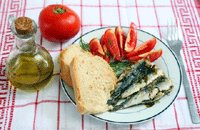Diet And Depression - Why What You Eat Affects The Way You Feel
Proven links between diet and depression mean it's essential to eat right during the menopause.
ADVERTISEMENT
Depression is on the increase, and one reason is that poor diet and depression are closely connected. People who eat quantities of junk food, full of unhealthy fats, sugars, refined flour and chemical additives, deprive their brains - the seat of depression - of vital nutrients, and are 60% more likely to be depressed as a result, according to research reported in The British Journal of Psychiatry.
Moods are influenced by the amount of chemical neurotransmitters in the brain, and these in turn are affected by diet. Fresh fruit and vegetables raise the levels of serotonin, which promotes wellbeing and calm, while high protein foods enhance the levels of the neurotransmitters dopamine and norepineprine, which make you feel alert, positive and energetic. Eating junk food slashes these chemical levels - and your spirits plummet alongside them.
Diet and depression: what to eat
 |
| ©Dreamstime.com/Paul Cowan
|
Switching to a healthier diet and including some extra exercise could be especially helpful in handling menopause depression, especially if you have mild to moderate depression.
It's something you can try alongside other ways of dealing with depression. If your depression is severe, you should consult your doctor, as dietary changes, although they can certainly benefit your general health, may not be enough on their own to lift your depression.
- Eat plenty of fresh fruit. It contains antioxidants which guard against depression.
- Have one or more daily portions of green leafy vegetables like cabbage and spinach, cruciferous veg like broccoli, and pulses such as chickpeas and lentils. These all contain folate which helps prevent depression.
- Eat oily fish from sustainable sources - salmon, sardines, herrings, mackerel, trout - 2-3 times a week. These species contain omega-3 oils, which possibly help to reduce warning signs of depression.
- Stay hydrated - make sure you drink enough liquid, preferably water, each day. Steer clear of soft drinks and colas.
- Eat more wholegrain foods, nuts and pulses. Your body absorbs the sugar from these foods more slowly, which helps to keep your blood sugar level stable and prevent mood swings. Wholefoods also contain vitamin B1, folate and zinc, all of which may help to avert depression.
- According to the Mental Health Foundation, the amino acid tryptophan, found in protein, has an important influence on mood. To keep your brain well supplied with tryptophan, include a portion of a high-quality protein at every meal: lean meat or poultry, fish, eggs, cheese, milk or yogurt, pulses, nuts, beans or lentils, nuts or a vegetarian protein such as Quorn.
- Eat a varied menopause diet to ensure that you get a wide range of nutrients and aren't lacking in any of the essentials that can help to combat depression.
Diet and depression: what to avoid
- Keep a careful eye on food serving sizes - even with a healthy diet you shouldn't overeat if you want to avoid weight gain in menopause.
- Instead of skipping meals, or have just one or two large meals a day, try eating several small meals a day. This is a good strategy for keeping your blood sugar level stable, which can help to even out mood swings.
- A wheat/gluten allergy can make you depressed. If you think you're susceptible to food allergies, experiment by cutting out wheat products, dairy and caffeine in turn, and see if this helps lift your depression.
- Cut out sugar, high-fat snacks, fried foods - all the junk. Apart from making you more likely to experience menopausal weight gain, high-sugar foods give you an instant sugar-boost which soon wears off, leaving you feeling sluggish and depressed.
- Keep your weight at a healthy level. Menopause weight gain - or excessive weight loss - can affect your mood. If you've gained weight, be careful to cut out sweets, chocolate, pastry, cakes and desserts and take more exercise.
- Alcohol is a depressant, and you should consider cutting it out completely if you are feeling depressed. Your body uses up valuable mood-boosting nutrients such as thiamin and zinc as it processes alcohol, which can leave your brain short of these essential depression-beating chemicals.
Go back to the top of Diet And Depression. Go to the Home Page of Beat Menopause Weight Gain.





